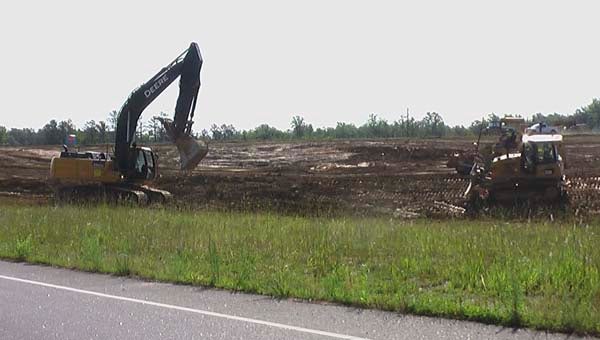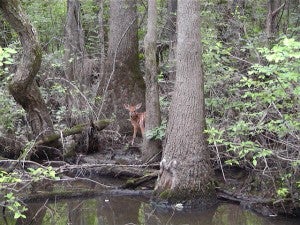Riverkeeper report: Clear-cutting swamps will mean more flooding
Published 10:40 am Friday, June 21, 2013

An area near the Rolls Royce plant, off Route 460, is being prepared for a paving operation. — Jeff Turner | Tidewater News

A typical cypress tupelo swamp is home to diverse wildlife, including this fawn, which was caught on camera on the Nottoway wetland area. — Jeff Turner | Tidewater News
“I just seems like whenever we get a big rain, the river rises so much faster now. Why is that?” This is a question I am getting asked more and more. Certainly I don’t know all the reasons but I know two of them.
The bad news is the flooding issues are only going to get worse on the lower end of the Blackwater and Nottoway rivers. Last week a citizen from Prince George County invited me up there to look at one of the reasons. What I saw was mega industrial parks with hundreds of acres of land being paved. I was stunned. Now I’m not against development at all. The problem with the area around the Rolls Royce facility off of Rt. 460 is that it is smack dab at the beginning of the Blackwater. Now you noticed I did not say Blackwater River and that’s because it’s not a river there. Instead it is a beautiful complex wetland area. This lush watershed and vast tupelo/cypress swamp is what the Blackwater is born out of. Unfortunately the wholesale paving of the land bordering the swamp means a humongous increase in the amount of water coming towards Franklin.
I think the average person has no concept of how much storm water runs off of a single acre of pavement. Of course that figure is contingent upon the amount of rainfall that falls on it. These massive industrial parks have stormwater retention ponds that are supposed to mitigate the runoff that would normally soak into the ground. However they can only handle normal rainfall, not Northeasters, hurricanes or other heavy rain events. The reason is simple my friends. Look at a retention pond the next time you ride behind let’s say Lowes in Franklin. What do you see? A pond that already has water in it and is nearly full. So it does not take a genius to understand that not much more water can go into the pond and when it gets full, it overflows. So retention ponds do nothing to mitigate the water that’s not going into the ground hence negating flooding. Retention ponds retain, they retain sediment, road salts and other accumulated stuff from the pavement and that’s great —for that issue.
Okay, so that’s one reason — the other is the wholesale clear cutting of our swamps. Once again, I’m not against logging either. I like toilet paper as much as the next person. However the clear cutting of our swamps for the purpose of heating homes in Europe is going to end up getting peoples feet wet in Franklin. These swamps are critical to slowing down floodwaters and acting as giant holding ponds for excess water. The great thing about these natural retention ponds is that they have these things called trees that are in them that soak up LOTS of water. When the trees are not there the “soak-up” factor is severely decreased. I’m not even going to go into the habitat/wildlife destruction aspect of clear-cutting our swamps in this article — that warrants its own book.
Okay, so now you have the complaint. What’s the fix? The fact is we are not going to fix what has already been badly done; not going to be able to mitigate it either. What’s done is done. However there are methods that are proven and methods or ideas yet to be tried that will and that must be put in to play for these issues.
On the development side, maybe not building four industrial parks back to back, side by side, would be a good idea. Build then in a “drier” location and not adjacent to the headwaters of a river. Yes, I know swampland is cheaper than high ground, but what’s cheaper in the long run? Better more expensive land on the initial purchase or the cost of a whole town having to be rebuilt after a flood, then another flood, then another? Maybe use permeable surfaces so there is not even a need for a catch basin or useless ponds. Again, more expensive now or more expensive later — oh, but that’s right. They (upriver) have no incentive to spend the extra money to reduce flooding downriver, because THEY DON”T LIVE OR WORK DOWNRIVER. And how bout the logging swamps thing. Well, just not clear cutting swamps would be great, or maybe putting some real laws into place that mandates there be substantial buffers left along rivers, say 100 yards. In Virginia currently there are no laws that mandate you leave a buffer — it’s all voluntary. Most buffers are a scant 50 ft. Now I’m just advocating the 100-yard buffer for swamps along defined rivers or major tributaries. For other swamps maybe selective logging should be the only logging allowed. It is a sin and a travesty for majestic old cypress to be logged out just to end up being shredded and made into mulch or anything else for that matter. Take the money wood and leave the old hollow tupelo and cypress alone. That method would leave some habitat and some flood control intact, not perfect, but better that clear cutting.
In closing there has to be middle ground somewhere between the environmental side and the progress/let’s make a living side. It’s a shame in my opinion there are two sides, two camps anyway. Each constantly juggling numbers and data, reports and studies, each trying to prove how wrong or bad the other is. Just think how much progress could be made if the two sides would pool their knowledge and resources to eliminate these ever present issues. Just think how much drier our feet would be here on the lower end of the two rivers we call the Blackwater and Nottoway!
JEFF TURNER is riverkeeper for the Blackwater/Nottoway River Keeper Program, an environmentally conscious organization that focuses on keeping local waterways healthy. BNRP’s parent organization is The Waterkeeper Alliance. Contact Turner at his website, www.blackwaternottoway.com.





